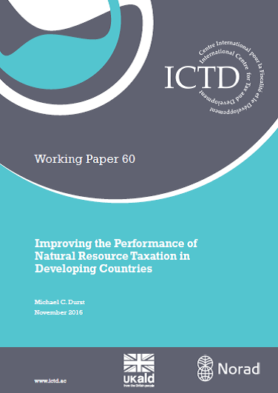ICTD Working Paper 60
This paper explores the administrative challenges posed to developing countries as a result of the increasing emphasis in fiscal regimes for natural resource extraction since the Second World War on income-based taxes, including both corporate income and resource rent taxes, as opposed to royalties. The paper identifies both the political consequences and technical challenges (particularly in the area of enforcement of arm’s length pricing in the natural resource context).
Politically, the paper argues that reduced reliance on royalties has clouded the imagery of natural resource taxation as a means of ensuring governments fair market compensation for the alienation of their non-renewable resource endowments, and instead has rendered natural resource taxation increasingly vulnerable to the political scepticism that has surrounded corporate income taxation in recent decades. The greater exposure of natural resource levies to this scepticism appears to have led to high levels of toleration of corporate tax avoidance by governments at all levels of economic development. From a technical perspective, the paper argues that income-based levies are intrinsically far more vulnerable to avoidance than royalties, posing substantial administrative challenges to those developing countries that wish to achieve high levels of tax compliance.
Today, natural resource fiscal regimes around the world typically employ a mixture of royalties and income-based levies; this mixture is intended to afford a balance of protection against financial risks to governments as well as investors. Despite the shortcomings of income-based levies, this paper does not advocate that the practice of mixed fiscal regimes be abandoned. Nevertheless, the paper argues that in the interest of greater administrability, the mix of fiscal instruments might be adjusted to some extent in favour of royalties, especially to the extent royalties include rates that adjust with product prices, so that their incidence correlates to a substantial extent with investors’ net income.
In addition, the paper suggests technical means by which developing countries might improve the performance of income-based natural resource levies. In particular, using the Norwegian reference pricing system for North Sea Oil as a model, the paper argues that developing country governments might obtain greater control over revenue losses by adopting ‘administrative pricing’ regimes. Under these the government, rather than the taxpayer, takes the initiative in establishing arm’s-length product prices based on both posted price benchmarks and research into local pricing conditions (including, for example, local variations in product quality, and prevailing industry practices with respect to sales contract duration). Although administrative pricing regimes are now most common with respect to oil and gas, the paper recommends that the use of these regimes be expanded to hard minerals taxation. The paper also explores the extent to which developing country governments might apply principles of administrative pricing not only to the determination of product prices, but also to the arm’s-length limitation of related-party expenses for services and supplies, as well as the control of excessive interest expense.
